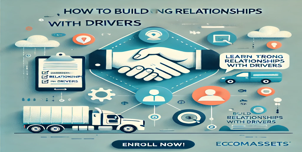Strengthen Relationships with Drivers: Essential Skills from Ecomassets’ Truck Dispatching Courses
How to Build Strong Relationships with Drivers Through Best Truck Dispatching Course
Drivers are the backbone of the trucking industry. Their ability to perform their duties safely and efficiently directly impacts the success of a dispatching operation. However, the nature of their work can sometimes lead to feelings of isolation or frustration, particularly when communication with dispatchers is lacking or unclear.
Key Benefits of Strong Relationships:
- Enhanced Communication: Clear and consistent communication reduces misunderstandings and ensures that drivers are fully informed about their routes, schedules, and any changes.
- Increased Trust: When drivers feel supported by their dispatchers, trust builds, leading to more cooperative and reliable interactions.
- Higher Job Satisfaction: Drivers who have positive relationships with dispatchers are more likely to experience job satisfaction, leading to lower turnover rates.
- Improved Efficiency: A collaborative relationship allows for smoother operations, quicker problem resolution, and more efficient route planning.
Best Practices for Building Strong Relationships with Drivers
1. Prioritize Open and Honest Communication
Effective communication is the foundation of a strong dispatcher-driver relationship. Dispatchers should always strive to provide clear, concise, and timely information to drivers.
Tips for Better Communication:
- Regular Check-Ins: Schedule regular check-ins with drivers to discuss their concerns, provide updates, and offer support.
- Active Listening: Listen to drivers’ feedback and concerns attentively, showing empathy and understanding.
- Transparency: Be honest about challenges and delays, and work together to find solutions.
How Ecomassets Can Help:
- Ecomassets’ best truck dispatching course includes modules on effective communication strategies for dispatchers.
- Learn how to maintain open lines of communication with drivers through the best truck dispatching course online offered by Ecomassets.
2. Recognize and Appreciate Drivers’ Efforts
Acknowledging the hard work and dedication of drivers is crucial for fostering a positive relationship. Simple gestures of appreciation can go a long way in making drivers feel valued.
Tips for Driver Appreciation:
- Public Recognition: Highlight drivers’ achievements during team meetings or in company newsletters.
- Personalized Thank Yous: Send personalized messages or notes of appreciation to drivers.
- Incentives and Rewards: Implement a reward system for safe driving, on-time deliveries, or exceptional service.
How Ecomassets Can Help:
- The truck dispatching training course at Ecomassets offers insights on creating incentive programs that motivate drivers.
- Join the truck dispatching training online at Ecomassets to learn how to effectively recognize and reward drivers.
3. Provide Support and Resources
Drivers often face challenges on the road that require quick decision-making and problem-solving. Dispatchers should be proactive in offering support and providing the necessary resources to help drivers succeed.
Tips for Offering Support:
- Emergency Assistance: Ensure that drivers know how to reach dispatchers in case of emergencies or breakdowns.
- Training and Resources: Provide ongoing training and access to resources that help drivers improve their skills and stay safe on the road.
- Mental Health Support: Recognize the stress and isolation that can come with long-haul driving, and offer mental health support when needed.
How Ecomassets Can Help:
- Ecomassets’ online dispatch course covers best practices for supporting drivers in challenging situations.
- Gain insights on how to equip drivers with the tools they need through Ecomassets' truck dispatching training course.
4. Collaborate on Problem Solving
When issues arise, whether they’re related to scheduling, routing, or unforeseen delays, dispatchers and drivers should work together to find the best solutions.
Tips for Collaborative Problem Solving:
- Involve Drivers in Decision-Making: When appropriate, involve drivers in decisions that affect their routes or schedules.
- Brainstorm Together: Encourage drivers to share their insights and ideas for overcoming obstacles.
- Implement Feedback: Show drivers that their feedback is valued by implementing their suggestions when feasible.
How Ecomassets Can Help:
- Learn collaborative problem-solving techniques in the best truck dispatching course offered by Ecomassets.
- Enhance your ability to work closely with drivers through the best truck dispatching course online provided by Ecomassets.
5. Ensure Fairness and Respect
Treating drivers with fairness and respect is non-negotiable. Dispatchers should always strive to create a work environment where drivers feel respected and fairly treated.
Tips for Fairness and Respect:
- Equal Treatment: Ensure that all drivers are treated equally, without favoritism.
- Respect for Time: Respect drivers’ time by minimizing unnecessary delays and ensuring fair scheduling.
- Clear Expectations: Set clear expectations and provide constructive feedback in a respectful manner.
How Ecomassets Can Help:
- Ecomassets’ truck dispatching training online emphasizes the importance of fairness and respect in dispatcher-driver relationships.
- The truck dispatching training course at Ecomassets offers strategies for maintaining a respectful and equitable work environment.
Conclusion
Building strong relationships with drivers is key to a successful truck dispatching operation. By prioritizing open communication, recognizing drivers' efforts, providing support, collaborating on problem-solving, and ensuring fairness, dispatchers can foster positive, productive relationships that benefit both the drivers and the company. Ecomassets offers the best truck dispatching courses, including online options, to help you develop these essential skills. Invest in your dispatching career by enrolling in Ecomassets' courses today.

